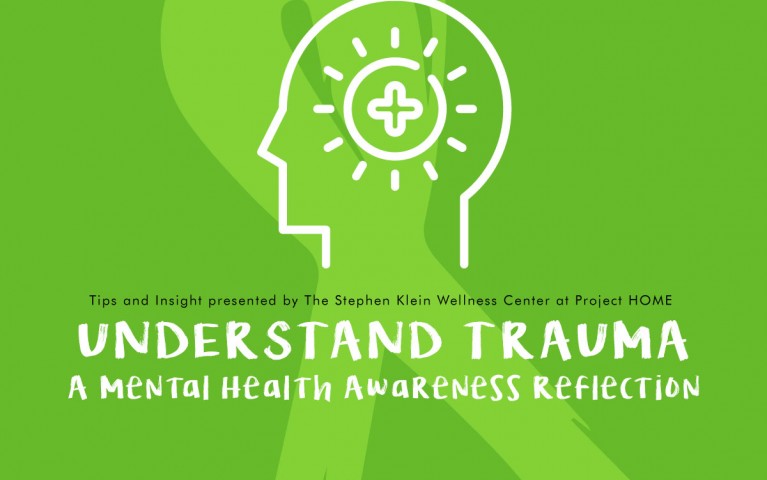A Mental Health Awarness Reflection: Understanding Trauma

Our mission at Project HOME is "None of us are home until all of us home." For me, as a Behavioral Health Consultant at Stephen Klein Wellness Center, the destination "home" is as much a safe place where we live, as it is a safe place within ourselves - a safety rooted in mental wellness.
Many situations can disrupt our mental health, which can cause strong feelings of anxiety, confusion, fear, sadness, or stress. Even good or wanted changes can be as upsetting as unwanted changes.
Life is a series of adjustments and changes, and for this reason taking care of our mental health should become a regular practice.
Additionally, trauma is a central issue for many people with mental health issues and can make life adjustments more complex and painful.
Trauma means different things to different people, and what is traumatic to one person may not be traumatic to another.
Bessel van der Kolk – psychiatrist and leader in the research on post-traumatic stress writes, “traumatized people chronically feel unsafe inside their bodies: The past is alive in the form of gnawing interior discomfort." This discomfort is most often expressed as poor mental health.
Our foundation, which consists of our experiences, beliefs and values, personalities, and self-esteem - over the years tend become weathered by traumas included but not limited to abuse, the behaviors of others, bigotry, community violence, gender-based violence, genetics, homelessness, incarceration, loss, mental health concerns, poverty, racism, sexism, and substance abuse.
As a survivor various kinds of trauma – including childhood abuse and rape – I continue to struggle with Post-Traumatic Stress Disorder, an eating disorder, depression, and anxiety.
To help return to a sense of inner peace and safety - to aid ourselves and others in managing life’s varied adjustments and healing that invisible “gnawing interior discomfort” - we can do various things.
The Global Council on Brain Health recommends we engage in the following to have mental wellness:
• Connect through meaningful relationships, community, and faith-based groups.
• Discover ways to laugh, feel gratitude, and learn new things.
• Move around, exercise, and enjoy the outdoors.
• Nourish through engaging in talk therapy and other professional help, making healthy lifestyle choices, and providing warmth and kindness to ourselves and others.
• Relax by breathing deeply, decluttering, disconnecting, forgiving others and ourselves, and getting restful sleep.
These steps – in conjunction with the healing power of acceptance, active listening, compassion, gratitude, hope, humor, patience, resilience, unconditional kindness, and understanding – heal and help unlock the doors to ourselves.